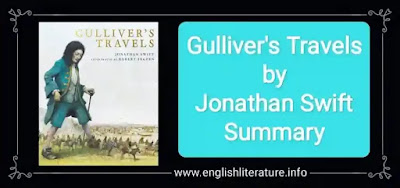Also Read
Gulliver's Travels by Jonathan Swift is the indictment of the human race for refusing reason and benevolence as the ways of life. Mr. Gulliver, ship's doctor on the Antelope is shipwrecked. He manages to make for the shore and he finds himself in the land of Lilliputs humans only six inches tall. The voyage to Lilliputs is concerned with the English politics of the time. He exposes the infinite littleness and absurd pretensions of man. Gulliver makes his second voyage to the land of Brobdingnag. Gulliver becomes the pigmy and the same moral is driven home. In the third voyage to Laputa and other islands, Swift attacks philosophers, projectors and inventors and all who waste their energies in pursuit of fantastic things. The fourth voyage is to the land of Honyhutnms and Yahoos. Honyhutnms have the shapes of horses and Yahoos are a frightful race having the form and appearance of men, but living in unspeakable degradation.
This most delightful children book turns out to be one of the bitterest satires on mankind ever described. Swift suggests that man should be governed by reason, but the lower elements of his nature debase what is fine within him. The irony is devastating and the style is powerful, lucid and colloquial.
In Book I, we have an exposure of human pride and pretensions, of cruelty, vanities, rituals, and meaningless quarrels that characterize man in society. The satire in this part is particularly aimed at the politics of Swift's day and of all days. The description of the statesmen who obtain place and honor by cutting capers (jumping merrily) on the tight rope before their sovereign, and the two great parties the Littledians and Bigendians who plunged the country into civil war which took a toll of eleven thousand human lives over the question of whether an egg should be broken on its larger end or smaller end is a scathing satire on the politics and statesmanship of the day.
In Book II Swift lashes man's meanness which appears all the more detestable in view of the greatness of the Brobdingnagians. The reaction of the King to Swift's description of the invention of gun powder and the use of instruments of warfare is a horrible satire on the cold, calculating way generals and diplomats of the day talked of armed action. On hearing Gulliver's description of his people's conquests and warfares, the King comments that Gulliver's people must be "the most pernicious race of little odious vermin that Nature ever suffered to crawl upon the surface of the earth." Man is equated with an odious vermin.
In the first three books, Swift expresses the habit and custom with which men deceive themselves and to show the crude vices of humanity as he saw them. In the fourth book, the beastly Yahoos (man) are contrasted with Honyhuhtnms who in the shape of horse embody pure reason.
As a satirist, Swift is indirect, detached and ironical. He does not employ the denunciatory style of Juvenal or Carping stinging method of Pope. An interesting story hides devastating satire. His prose is vigorous and lucid.
